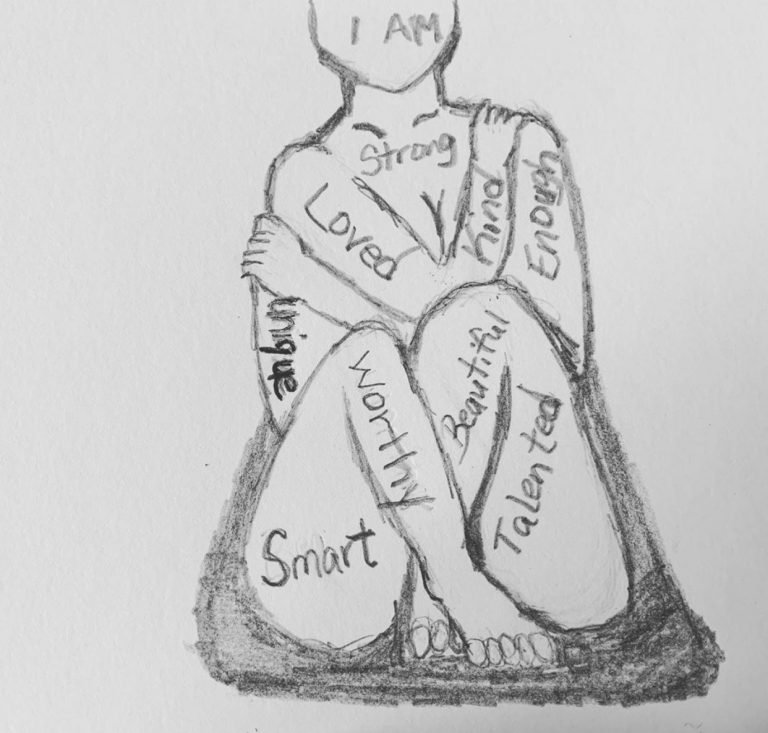I’ve noticed that when it comes to suicide, there is a lot of advice out there for the loved ones of a person who is suicidal. They are given various options on what they can do to help prevent their loved one from commiting suicide. But, what about the person who is struggling with suicide? Are they helpless? Can’t they also be responsible for protecting themselves? I’m not saying they should be blamed for mental health issues; however, I also believe that it could be empowering to them if there were things they could do to help protect themselves as well.
While I haven’t struggled with suicidal thoughts myself, I have struggled with depression most of my adult life. And I know that when it comes to mental health there are good days and there are bad days. On the good days people often worry about what they may do on the bad days. Similarly, most people who struggle with suicidal impulses, have good days where they dread being the person they become and having the thoughts they have on the bad days. But, we aren’t limited to just sitting around waiting for and fearing the bad days. Just as I can do things on my good days to help prepare myself for the bad depression days, I have to believe that people with suicidal impulses can use their good days to put up some “safety nets” in order to prevent the worst on their bad days. So, I’ve collected a list of tips, tricks, and advice that could hopefully help people protect themselves from suicide, and here it is:
Develop a Safety Plan
List out warning signs which help you identify that you are starting to experience significant, severe thoughts of suicide.
Write out a safety plan and actively turn to it when the warning signs start to show.
Preventative Steps You Can Take:
Have a list of people to contact during a crisis.
Create this list by being honest with people and telling them about your struggles with suicidal thoughts. Ask them if they are willing and capable of being one of your accountability partners. Call or go to them when suicidal thoughts threaten to get the best of you.
Remind yourself that the feeling will pass.
It has before and always will. In contrast, acting on a temporary feeling has permanent consequences. Place notes or signs with this sentiment around your home, vehicle, and workspace, so they will be there when you need reminders.
Find someone or something to live for: a family member, a friend, or a pet, which depends on you staying alive to take care of them; or even a future goal to accomplish.
Sometimes it is simply easier to stay motivated; to keep living for the sake of people or animals that you love, than it is to stay living for yourself. And that’s okay. There is nothing wrong with staying alive because of the knowledge that you are needed. And if you aren’t certain you are needed at the moment, then, on your good days, find a way to make yourself needed, so you have that safety net and knowledge for the bad days.
On your good days work to sabotage your preferred suicide method, so when the bad days come it will be difficult to commit suicide.
Be honest with yourself about what your preferred method would be, and then limit your access to the things required to enact it. For example: unload guns, put dangerous things in a locked safe, take down any poles or hooks which can hold a lot of weight, have someone you trust be in charge of your meds-even over the counter ones like ibuprofen. Research shows that “method substitution”--choosing an alternate method when the original method is restricted--does not happen often. Put time and distance between yourself and your chosen method.
Learn that you aren’t alone. No one is completely happy in their lives or their bodies. Most people have struggled with negative thoughts, and many with suicidal thoughts.
You aren’t abnormal. All those other people found ways to survive it and continue to live in spite of it/after it. They are proof that this can be overcome and you can win this battle.
Figure out what kind of life you want and make a step by step plan for earning that life and work towards it.
A lot of people who have attempted suicide said that as they thought they were dying, they realized they didn’t actually want to die; they just wanted a different life. Starting a new life may seem hard or scary but it is a lot easier than suicide, and, if you think about it, what do you have to lose? Might as well try for a new life. Also, a step-by-step plan will give you a goal to focus on and each step completed will give you a feeling of success and accomplishment.
“Be merciful to me, O God, be merciful to me,
for in you my soul takes refuge;
in the shadow of your wings I will take refuge,
till the storms of destruction pass by.
I cry out to God Most High,
to God who fulfills his purpose for me.
He will send from heaven and save me;
he will put to shame him who tramples on me.
God will send out his steadfast love and his faithfulness.”
-Psalm 57:1-3 (ESV)
What Does the Bible Say to do When Life Starts to Crush Us?
* * *
It says to turn to God. He is our Savior from anything and everything. Ask Him for help, and trust that He will provide.
“Humble yourselves, therefore, under the mighty hand of God so that at the proper time he may exalt you, casting all your anxieties on him, because he cares for you.” - 1 Peter 5:6-7 (ESV)
God loves you and made you in His image. You are worthy of a life filled with love and purpose.
If you struggle accepting this truth emotionally, you can find practical things to do that will encourage emotional acceptance of it: helping other people, spreading God’s Word, finding a job which adds value to society. Work to live your life according to God’s grander purpose and eventually you will be able to see how valuable your life is, not only to God, but also to the world around you.
Ask God for help and He will show up.
God will provide a way through the struggle but those provisions aren’t always miraculous occurrences or instant healing. Most of the time God provides quietly, in practical ways: like a phone call from a friend when you’re close to the edge, or an unexpected income source to pay for the bills accrued from going to therapy.
Even when you don’t know how to ask for help for yourself, the Holy Spirit knows what you need and is crying out to the Father on your behalf.
“In the same way, the Spirit helps us in our weakness. We do not know what we ought to pray for, but the Spirit himself intercedes for us through wordless groans. And he who searches our hearts knows the mind of the Spirit, because the Spirit intercedes for God’s people in accordance with the will of God.” -Romans 8:26-27 (NIV)
Our world teaches us that the end goal of life is independence; but God wants us to accept our dependence on Him.
“No temptation has overtaken you that is not common to man. God is faithful, and he will not let you be tempted beyond your ability, but with the temptation he will also provide the way of escape, that you may be able to endure it.” -1 Corinthians 10:13 (ESV)
“But he (God) said to me (Paul), ‘My grace is sufficient for you, for my power is made perfect in weakness.’ Therefore I will boast all the more gladly of my weaknesses, so that the power of Christ may rest upon me. For the sake of Christ, then, I am content with weaknesses, insults, hardships, persecutions, and calamities. For when I am weak, then I am strong.” -2 Corinthians 12:9-10 (ESV)
These verses aren’t claiming that life won’t be harder than we can handle. They are specifically talking about overcoming the temptations which the world throws at us. But even for those temptations, we are not supposed to rely on ourselves to overcome them: it is God who “provides the way to escape”. God uses our weaknesses to show the world His strength in order to draw people to Him.
“My flesh and my heart may fail, but God is the strength of my heart and my portion forever.” -Psalms 73:26 (ESV)
The best way to fight thoughts of sadness and even suicide is to regularly stay in the Word of God.
Find verses which remind you of God’s presence and power and of how much He loves you. Memorize them so you can repeat them to yourself in times of anguish. His promises will help you endure these times.
“The Lord is near to the brokenhearted and saves the crushed in spirit. Many are the afflictions of the righteous, but the Lord delivers him out of them all.” -Psalms 34:18-19 (ESV)
“Do not be anxious about anything, but in every situation, by prayer and petition, with thanksgiving, present your requests to God. And the peace of God, which transcends all understanding, will guard your hearts and your minds in Christ Jesus.” -Philippians 4:6- (NIV)
Also see: Psalms 16:8; Psalms 23:4; Psalms 55:22; Psalms 94:18; Isaiah 53:4; Matthew 11:28-30; Romans 15:13; 1 Cor. 1:3-4; 2 Cor. 4:16-18; 1 Peter 5:6-10
Do not try to go it alone.
If you feel suicidal thoughts start to invade your mind, seek professional help immediately!
Call your therapist and/or go to the Emergency Room.
There is no need to go it alone. God wants us to cry out to Him, to seek out godly counsel from others, and when necessary, to request medical help. We live in a sin-cursed world, which means our bodies are imperfect and sometimes things like hormones or brain chemistry can be off balance. God gave humans the intelligence necessary to understand science and create medical solutions. There is nothing inherently wrong with using helpful medications.
Remember, with medical solutions there is usually a period of trial and error, because everyone’s body is different and you need to find what works for you. If you try one method or medication and it doesn’t work, don’t give up. Try a different one until you find the right fit. Millions of people have had success with medical intervention; it could work for you as well.
Healing Takes Time
Contact the Suicide Prevention Lifeline
Call: 1-800-273-8255
or chat online: www.suicidepreventionlifeline.org
You can download a free printout of this information by going to our “Free Material” Page and clicking on “Protect Yourself from Suicide (full page)” or for a shorter version: “What Does the Bible Say to do When Life Starts to Crush Us?”.
This series of blog posts titled, “Holding on to Reason”, is named after Amanda’s favorite C.S. Lewis quote: “Faith is the art of holding on to things your reason has once accepted, in spite of your changing moods.”

























































































